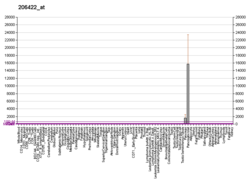Proglucagon is a protein that is cleaved from preproglucagon. Preproglucagon in humans is encoded by the GCG gene and is composed of 180 amino-acid residues.[5][6]
Proglucagon is a precursor of glucagon, and several other components. It is generated in the alpha cells of the pancreas and in the intestinal L cells in the distal ileum and colon.
More specifically, preproglucagon is cleaved into the following components in different organs:
- Signal peptide (1-20) – removed from preproglucagon to form proglucagon (21-180)
- Glicentin (21–89)
- Glicentin-related pancreatic polypeptide (GRPP, 21-50)
- Oxyntomodulin (OXY or OXM, 53–89)
- Glucagon (53–81)
- Glucagon-like peptide 1 (GLP-1, 92–128) – first seven residues further cleaved
- Glucagon-like peptide 2 (GLP-2, 146–178)
Proglucagon itself is a protein with three repeats of slightly different secretin family hormones to be cleaved to form mature hormones.[7]
- ^ a b c GRCh38: Ensembl release 89: ENSG00000115263 – Ensembl, May 2017
- ^ a b c GRCm38: Ensembl release 89: ENSMUSG00000000394 – Ensembl, May 2017
- ^ "Human PubMed Reference:". National Center for Biotechnology Information, U.S. National Library of Medicine.
- ^ "Mouse PubMed Reference:". National Center for Biotechnology Information, U.S. National Library of Medicine.
- ^ Schroeder WT, Lopez LC, Harper ME, Saunders GF (1984). "Localization of the human glucagon gene (GCG) to chromosome segment 2q36–37". Cytogenetics and Cell Genetics. 38 (1): 76–79. doi:10.1159/000132034. PMID 6546710.
- ^ White JW, Saunders GF (June 1986). "Structure of the human glucagon gene". Nucleic Acids Research. 14 (12): 4719–4730. doi:10.1093/nar/14.12.4719. PMC 311486. PMID 3725587.
- ^ Pollock HG, Hamilton JW, Rouse JB, Ebner KE, Rawitch AB (July 1988). "Isolation of peptide hormones from the pancreas of the bullfrog (Rana catesbeiana). Amino acid sequences of pancreatic polypeptide, oxyntomodulin, and two glucagon-like peptides". The Journal of Biological Chemistry. 263 (20): 9746–9751. doi:10.1016/S0021-9258(19)81581-8. PMID 3260236.




